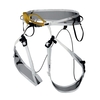James Pearson suggests E12 for his Bon Voyage at Annot in France
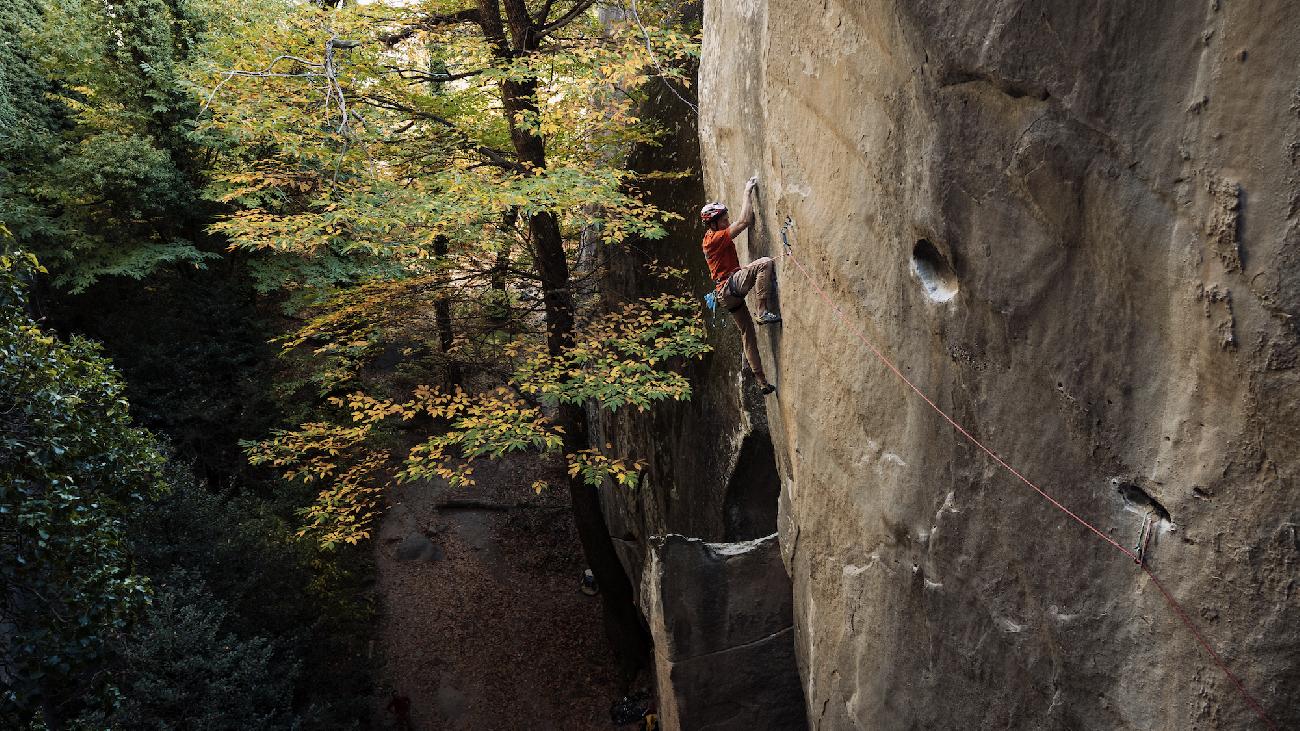
 1 / 25
1 / 25 Raphaël Fourau
Raphaël Fourau
In February 2023, James Pearson climbed his long-standing trad project in Annot, France, calling it Bon Voyage. Pearson was initially reluctant to offer a grade for the route and hoped to gain consensus from his peers in the community, before finally making his suggestion on its difficulty. He was however, certain that Bon Voyage had been his most difficult route to date.
Over the autumn, Pearson was joined in Annot by visiting climbers Jacopo Larcher, Sébastien Berthe and Ignacio Mulero, who have each spent some time trying the route. Taking their feedback into account, even in the absence of a second ascent, Pearson now feels confident to propose the grade of E12 for Bon Voyage. The 30-year-old British climber has detailed his thoughts below
BON VOYAGE by James Pearson
It’s 15 years since I told the world about The Walk of Life, a "first ascent" I’d climbed on the North Devon Coast in the UK. From front covers and multi-page spreads in climbing magazines, to an immersive section in the film Committed 2 from Hotaches Productions, celebrating everything that made the route so beautiful and terrifying, the news seemed to be everywhere!
Directly or indirectly, by suggesting the never-before-given grade of E12, I was shouting for anyone to hear that this was the hardest Trad route in the world, the hardest trad route ever climbed. Some of you believed me, I know I believed myself, but there were plenty amongst the climbing community who began to ask questions, and rightly so.
I was a poster boy for a new generation of British climbers, celebrated not only for my proficiency on rock, but also my bravery and courage. Whilst I had managed to climb a few beautiful and difficult repeats and first ascents on my home rock of Peak District Gritstone, and considered myself to be somewhat of a specialist on those short and intensely technical routes, the truth I was unable to see was that I was completely inexperienced in almost any other style of climbing.
Trad climbing in the UK holds itself to very high standards, from the ethical purity of the boltless approach to the often "sandbagged" nature of the most famous cliffs. When Dave Macleod repeated The Walk Of Life a few months later, explaining he felt the route to be closer to E9 than the E12 I had suggested, I was more shocked than anyone, and the fallout from that decision would change the course of my life forever.
15 years later, I’m a very different person. I’m a husband, I’m a father, and I’ve climbed hundreds of hard routes all around the world, yet I’m still somehow the same young boy, talking about a piece of rock, and asking for your approval.
Earlier this year I climbed a route called Bon Voyage. It’s a beautiful route up an otherwise blank wall, with a unique sequence and fantastic holds. Climbing it was the result of years of hard work and searching, and I feel that Bon Voyage is the hardest route I have ever climbed, by quite a long way.
A lot has been said in the media about the difficulty of the route, but very little has come directly from me. When I climbed the Walk of Life and told you it was the hardest thing I had done, I truly meant it. That was, and to this day still remains one of the hardest, most harrowing experiences of my life, yet I was so caught up in my own ego that at that time, I was unable to separate the concepts of "MY" and "THE".
To help me explain this to you, I want us to try to travel back in time to 2008... It would be embarrassing if I didn’t find it so unbelievable today, but I can remember genuinely wondering to myself back then, if I was somehow... a bit magic!.
I’d tried many sports as a kid, generally improving quickly until I ran up against a hurdle, then moving onto something new, but climbing was different! I started climbing at 16, which is really late by today's standards, but immediately felt like I’d found my place, and for the first several years at least I found myself going from strength to strength. By 18 I’d had my first magazine front cover, and picked up my first sponsorship deals, and by 19 I was the youngest Brit to have climbed V13, as well as the youngest person to have ever climbed E10!
I loved the feeling of control and freedom that climbing brought me, but I also loved the positive attention, and I was surrounded by a group of close friends and family who, whether they genuinely believed it or were just being very kind, told me, in short, that I was God's gift to climbing. Back then, a few people controlled the majority of the climbing media, and as long as they liked you, you were generally in a pretty happy place. Whilst there were clearly people who disliked me, and what they thought I represented, with my oversized logos and exclusivity magazine deals, I never heard about them, they just weren't a part of my world.
2008 was a time where Instagram, and social media as we know it, simply did not exist. As much as I dislike social media these days ,and I believe it brings far more negativity to the world than it should, one advantage of having random strangers take a dump on you on the internet on a regular basis is that you realise that the world is full of different viewpoints. Whilst we clearly still have echo chambers in 2023, they are nowhere near as soundproof as the one I’d built for myself back in 2008!
It was also a very different time in popular culture with a very different set of socially accepted rules. Whilst we often look back fondly at decades gone by, the 2000’s were a time when it was OK to bully, embarrass, or socially manipulate people publicly... Does anybody remember the TV shows like THE BIGGEST LOSER, THE MOMENT OF TRUTH, or THERE’S SOMETHING ABOUT MIRIAM? As much as I wonder if I’d have made the same mistakes if I’d been born 10 years later, I’m also not sure I would have been treated the same way?
I’m not saying all this in search of sympathy or forgiveness. It took a while to get here, but today I can honestly say I’m proud of myself, and of The Walk of Life, and that getting burnt, however painful it was at the time, helped me to see things more clearly, and after a lot of tears and moping, I had the revelation that "MY" hardest applies only to me, and not automatically to "THE" rest of the world!
Once I accepted myself for who I was, flaws and all, I could begin planning a happier future, and I moved to Innsbruck in Austria to begin piecing myself back together. The idea was simple... to train my weaknesses with some of the best sport climbers in the world and become James 2.0! Unfortunately, it wasn’t quite as simple as just turning up and drinking the Cool-aid, and despite my best efforts I spent the first 6 months feeling like the more I tried, the worse I became. By focusing on sport climbing, my natural weakness, I neglected my strengths of bouldering and trad. Too impatient to allow any training regime enough time to work, I jumped around from one protocol to the next, becoming ever more frustrated with myself, until sex, drugs and rock and roll took the place of climbing, and I lost myself completely.
Two things saved me, Caro and my sponsor, The North Face. Despite my many flaws, Caro became part of my life. The full story is obviously longer and more complicated, but in essence, she not only taught me how to avoid getting pumped after 5 moves, but more importantly that I could be something and somebody better. The North Face had understandably grown tired with my lack of climbing and hedonistic ways, but instead of cutting ties completely at the end of my contract period, they gave me 1 extra year to get myself back in gear. At the time I thought this was outrageous! I now see it as one of the best things that happened to me.
That year, 2012, I pulled my finger out! I climbed my first 9a sport route, and attempted to flash an E10 in Pembroke, falling on the very last move, luckily after all of the dangerous part!. It was my first time trad climbing in over 3 years, and it had been a pretty wild journey to see just how quickly you could progress when surrounded by all the right elements, butt hat trip to Pembroke was about so much more than pure performance...
For the last several years I’d been walking a very scary path, climbing ever more dangerous routes because I didn’t have the physical capacity to climb anything else. Carrying extra fitness not only made physically harder routes possible, it also made climbing fun and exciting again, and I can distinctly remember this new feeling of curiosity to see if I could fight to meet the challenge, instead of the dread I’d always felt that I’d simply fall off pumped!
This new approach to trad eventually led me back to Rhapsody in 2014. A route I’d previously criticised to avoid the truth that it was just too hard for me! Rhapsody represented far more than just a hard route. It was the answer to a question I still didn’t really know the answer to, and climbing it one windy morning in October felt like the end to a chapter of my life. I’d proved myself to my doubters, but most importantly to myself. The sky seemed to be the limit once more, and I began the same search I started all those years ago, but instead of looking for THE hardest, I was simply looking for MINE!
In the sphere of climbing, Trad is what I always seem to fall back on. It is what I dream about, and what keeps me working hard to better myself, year after year. As I’m sure a lot of you would agree, Trad is intense and complex, it tests your mental strength and tests your logistics, and there is nothing else quite like it, nothing so complete. However, trad is also slow, and often cumbersome, and rarely does it push you to your physical limit. I know that if I want to give myself the best chance to achieve the things I dream about, ironically I need to spend the majority of my time concentrating on other styles of climbing, just to be ready for my next trad route when the stars align. Perhaps that’s the base of any true love - to be able to accept the flaws and see past them.
When I climbed some of my hardest grit routes back in the day I hadn’t ever been able to lead them cleanly on a top-rope. I relied on a magical feeling that appeared whenever I was in danger, that not only allowed me to stay calm and remain hyper focused, but also made me feel physically stronger and more precise. Today, I still have this sensation, and I know of no calmer moment than when I’m on a hard trad lead, but if the route is genuinely dangerous, I also now make sure that there is next to no chance I’m actually going to fall.
If we take Harder Faster as an example, a route I climbed in 2019 with a 2 year old sleeping at the base of the crag, it is also a route I’d deemed unjustifiable in 2004 when my friend Toby made the 2nd ascent. Deciding to climb it in 2019 might seem like I’ve somehow grown braver, or stupider, but in reality I’ve just become better prepared and more patient and calculated.
The flip side is how much the extra preparation for climbing routes like this now costs my family life. For the 2 weeks I spent working towards Harder Faster, I was preoccupied and distant, focused only on the route, the moves, the weather, and everything in-between. To justify the risk I needed everything to be perfect, which takes a hell of a lot of time and energy, even away from the climb itself. There is a certain irony in that the effort to keep my family… complete, is what actually drives us apart! Perhaps I should just hang my trad boots up for good now I’ve got little ones, and stop finding obscure ways to justify fundamentally unjustifiable things?
One thing a lot of people don't know about me is that despite being pretty good at dealing with the pressure of serious injury or worse, when it came to pure performance pressure, I could be my own worst enemy. When the consequences of failure were simply that I’d need to try again, I often crumbled under the weight of my own expectations. As much as I love the development process of climbing new routes, both trad and sport, the climbing part was often about coping in that stress cycle long enough until I dragged my way up the thing. The funny thing is that after finishing a project and feeling that relief of clipping the chains, one type of purgatory was simply replaced with another, one that I actually found a hell of a lot worse… the grade!
I didn’t always hate grading. I used to quite enjoy the process of assessing my first ascents, linking a rigid alpha-numerical system to a human experience on rock, yet the Walk of Life showed me how easy it was to get things "wrong", and also how the reaction of the community can feel way out of proportion to the actual "mistake".
It actually makes me smile when I say those words… "Wrong"… and "Mistake", in relation to grades, which are in essence based on a climber's opinion and feelings. How can our feelings be "wrong"? How can we have made a "mistake", when all we did was to say honestly how a climb felt to us. It might surprise people to hear that I still use a very similar grading system to the one I used to grade the Walk of Life, one where I take into account how long the climb has taken me compared to other climbs I’ve done. Believe it or not, I’m not just flogging a dead horse, but genuinely believe it to be a solid method to grade a climb, as long as you have experience that backs up the style.
Self development requires constant work, and if I’m not careful I find myself slipping back into my selfish ways of the past, especially if I’m working on something really tough. I often tell people that climbing makes me a better person, but that’s not entirely true. Climbing makes me happy, but it can also turn me into a monster. Perhaps if I were truly selfless I might consider giving up, but if I actually did that I’m pretty sure I’d be a horrible person to be around. Like most things in life, it’s a balance we need to find. It’s not easy, and all we can do is try.
For a long time I held a grudge against the climbing community in the UK for the way I felt I’d been treated. It seemed cruel out of all proportion and I wanted nothing to do with them. I’d often think about the UK as my hypothetical ex, someone I loved and hated at the same time, and the more I'd do to try to win them back, the more they’d run away! It took a long time to process my feelings and to find peace within myself.
The early 2000’s were a very different time to today and I think we’ve come a long way as a community in terms of tolerance and inclusivity, but we still have a long way to go. Whilst we might be less likely to publicly humiliate people than we were in the era of those terrible television shows, there is still plenty of that going on in private, especially hidden behind internet anonymity. I know I’m not going to change the world on this subject, but I would love it if anyone reading this could think just a little more about how we treat one another, and realise that our words can carry significant weight, even if we don't take them seriously.
Becoming a father in 2018 could have been the end of professional climbing, but baby step after baby step Caro and I found our way back, not only re-discovering lost form, but also figuring out a lot of the issues that had held me back for years. With young children to care for and significantly less time than before, the pressure to perform seemed to disappear, and anything I got done became an unexpected bonus. I used to be the biggest conditions snob, but climbing with kids forced me to try to climb things whenever I could instead of whenever I’d have liked, and showed me that a lot of the barriers we find are
actually of our own construction.
By 2020, my hardest boulders and sport routes ever, and a fast ascent of Tribe, a contender for the hardest trad route in the world at the time, suggested I was ready for something new. I knew first hand from years of searching that finding a hard trad project is easier said than done, and letting go of control once again led me exactly where I needed to be. Without the luxury of being able to travel wherever and whenever we wanted, I found the line that would become Bon Voyage at Annot in the South of France, right next to one of my older first ascents, hiding in plain sight.
The whole process to climb the route was the most enjoyable of my climbing life, because instead of only focusing and stressing about the final send, I tried to simply enjoy every day. I found myself in a peaceful, almost meditative routine, enjoying the regularity of the activity, whilst watching the seasons change and my kids grow. I’d be lying if I told you I never worried about the weather, or my skin, or my tweaky fingers, but every time I found myself slipping, I managed to quickly pull myself out of that hole and back to enjoy the present.
I tried the route on and off over two years, then one day I climbed it, the hardest route I’ve ever done, and perhaps the hardest I ever will. For a couple of weeks I didn’t tell anyone, partly because I wanted time to process my feelings alone, and partly because I knew what questions would be waiting for me once I did. Climbing news in 2023 feels very reductive to me, generally consisting of Climber Name, Route Name and Grade, and I hoped for more for Bon Voyage as the process behind it had meant so much. I also, for one of the first times in my life, felt genuinely unable to offer a grade.
I’d analysed every part of the route, breaking it down into manageable chunks and trying to reconstruct those parts to give me a grade. Both these specific calculations and my initial gut feeling all pointed to the same number, but that number terrified me so much I just couldn’t commit. After quick ascents of a couple of 9a sport routes I knew I was in the best shape of my life. I thought the style of Bon Voyage suited me well, and I knew I’d had to train specifically just to stand a chance. Still, I also knew all too well the troubles of making first ascents, as well as the potential reaction of the British climbing community, should I make another "mistake"!
I know that I’m not the same climber, not even the same person as I was 15 years ago. I can see that A+B probably equals C, and know that at the end of the day, the only really important thing is that I had so much fun climbing an amazing bit of rock! I know all of these things, but I'm still haunted by the past.
It’s been a long hard slog to get here, and if I’ve learnt anything in the 15 years since The Walk Of Life, it’s that I don’t think it's ever going to be over. I also know a life doing something you love is such an incredible gift, and I’ll never stop fighting for it. I’ve got to a point when I realise I need to be brave, and I need to put my feelings out there even if there is a chance to be hurt… Bon Voyage - I think it could be E12
Pearson is sponsored by: La Sportiva, The North Face, Wild Country & Glorify



 Copia link
Copia link
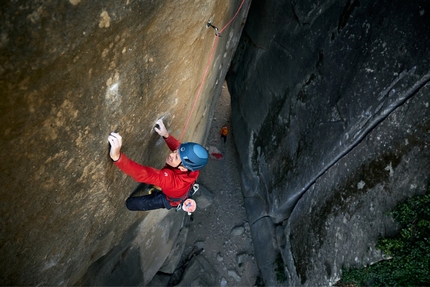
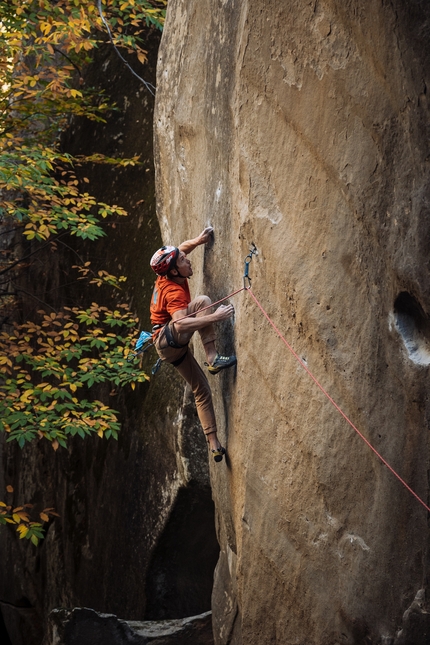
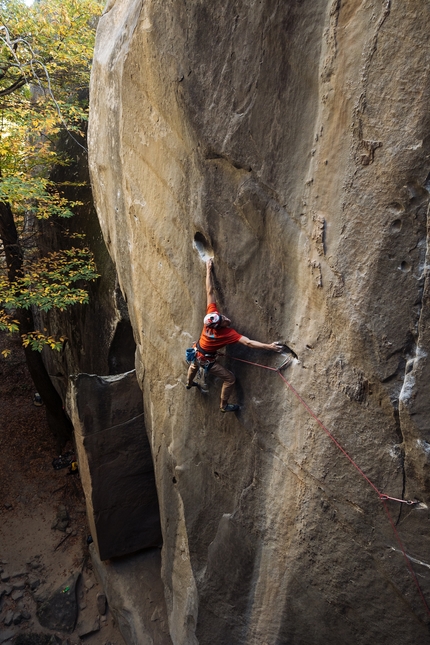
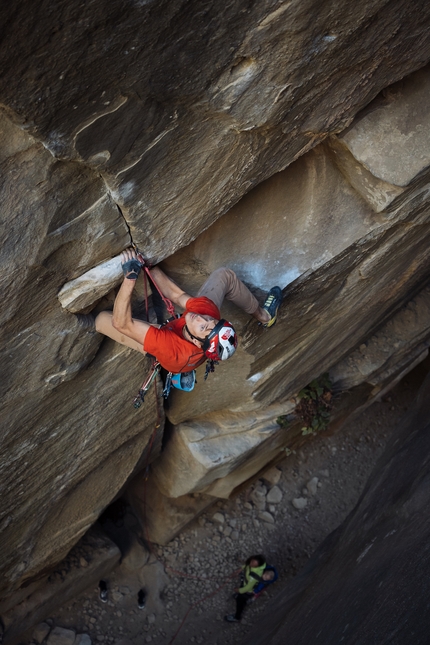
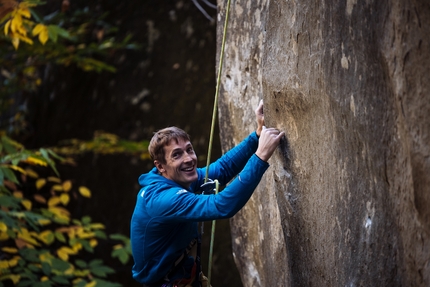



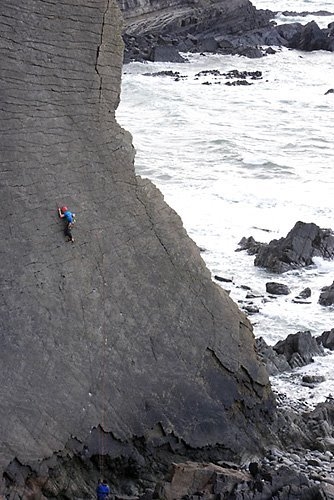

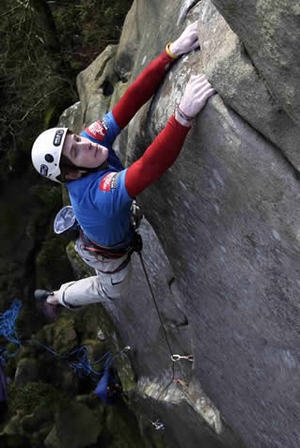

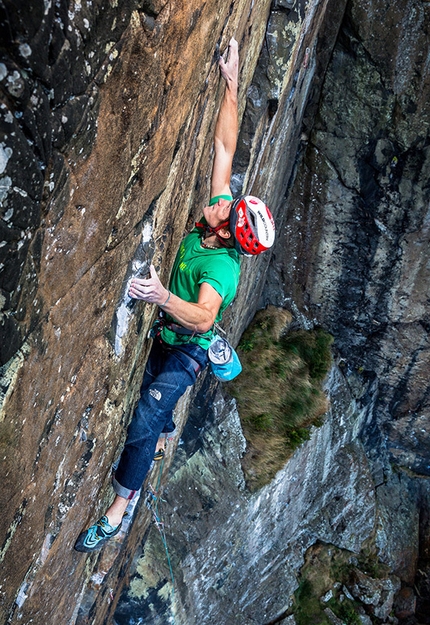
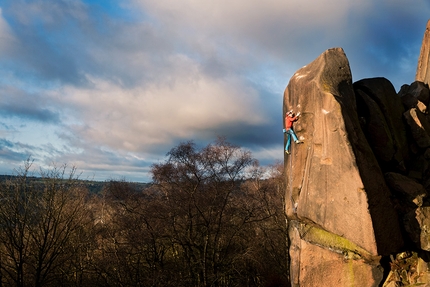
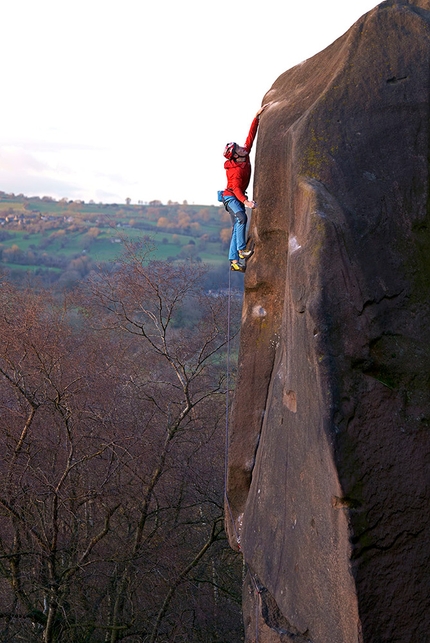
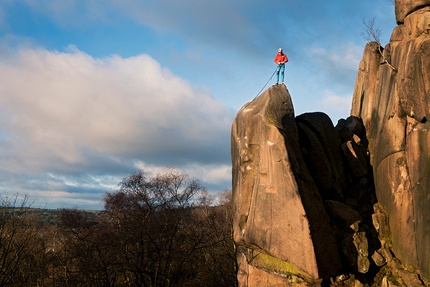
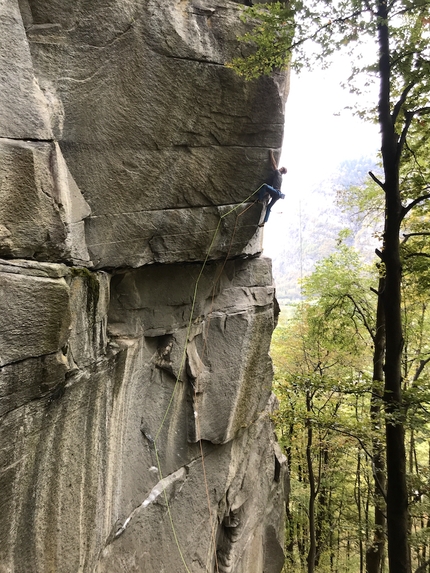
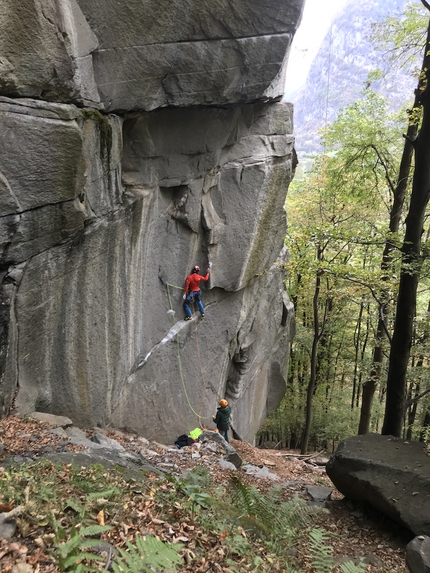
 See all photos
See all photos


















